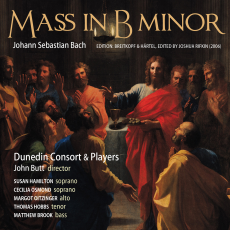Bach Mass in B Minor - Dunedin Consort - McAlister Matheson Music
For the Dunedin Consort's latest recording, director John Butt has opted to use Joshua Rifkin's 2006 Breitkopf & Härtel edition of Bach's Mass in B Minor. It is the first fully scholarly edition of the Mass as Bach left it on his death, with subsequent ‘improvements' (mostly by CPE Bach) removed, and taking account of various refinements that Bach is known to have made that, for various reasons, never reached his own score. This is the first recording to be made using this edition, and John Butt's booklet essay is a fascinating synopsis of the evolution of Bach's most spectacular choral work, drawing on Butt's own encyclopaedic knowledge of Bach's output, followed by a summary of the issues surrounding performance practice. The actual number of singers Bach might have used is discussed, particularly in relation to the doubling of vocal lines; Butt makes the point that Bach may have been more casual about this issue than many of today's scholars! The end result is a performance involving tens singers, with the basic one-to-a-part chorus doubled at strategic points by ripienists. As Butt points out, the effect of the doubling is this recording is an increase in sonority rather than volume. Any doubts that the use of smaller vocal forces might result in an under-nourished performance are swept away within the first few seconds. Clever balancing of the voices with the instrumentalists means that all parts are heard clearly; moreover, the singers' interpretation enhances the listener's sense of involvement. The singers do not have to be accommodated by means of employing faster tempi - indeed, the opening Kyrie and the Gratias were slower than I expected. However, an undeniable advantage conferred by smaller numbers is the degree of incisiveness and sense of uplift achieved in sections such as the Cum Sancto Spiritu at the end of the Gloria. In the Credo it would be difficult to imagine a more vibrant Et resurrexit - punchy, hard-edged singing, trumpets almost screaming, timpani thwacked mightily, all physical resources being flung into the music. The moments of repose are sweet - try Thomas Hobbs' tranquil Benedictus, or the ravishing flute-playing and singing (Hobbs again, with Susan Hamilton) in the Domine Deus. Matthew Brook manages to be both laudatory and expressive in the Quoniam tu solus sanctus, and second soprano Cecilia Osmond is a very good match tonally with Hamilton. But the discovery of the disc for me was Austrian alto Margot Oitzinger, her voice clear and flexible with a lovely bloom. Her solos (the Qui sedes and Agnus Dei) are gravely beautiful, while in the choruses her part shines through without disturbing the overall balance. This recording deserves a place in everyone's CD collection.

